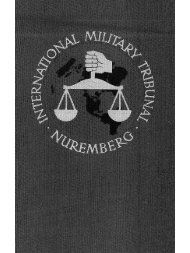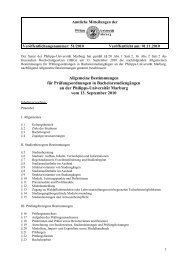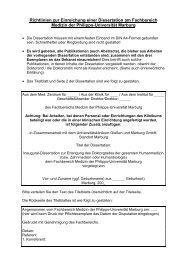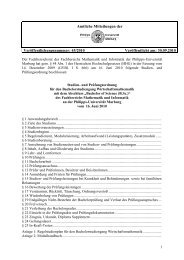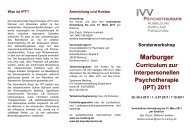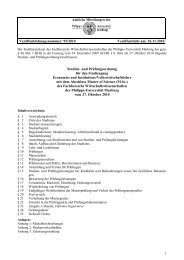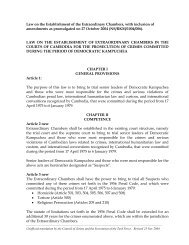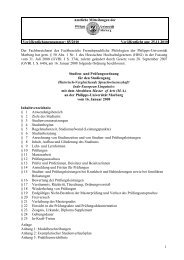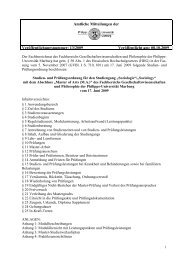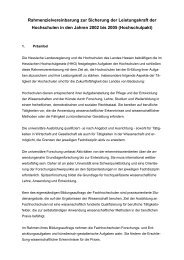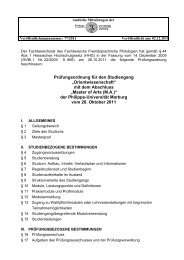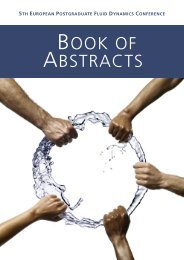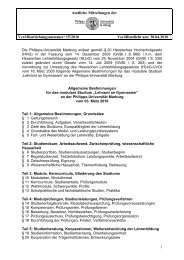Peace and Conflict Studies - uni-marburg
Peace and Conflict Studies - uni-marburg
Peace and Conflict Studies - uni-marburg
Create successful ePaper yourself
Turn your PDF publications into a flip-book with our unique Google optimized e-Paper software.
Inhalt und Qualifikationsziel This module explores issues in international political economy with an<br />
emphasis on conflict, cooperation <strong>and</strong> governance in a number of issue<br />
areas. The course introduces basic economic concepts in order to pursue<br />
advanced issues in international political economy such as trade relations,<br />
monetary relations, investment flows <strong>and</strong> competition <strong>and</strong> trade<br />
<strong>and</strong> conflict. The module discusses attempts to provide international<br />
governance in some of those issue areas <strong>and</strong> engages with the conceptual<br />
debate on how to assess whether institutional solutions have (significant)<br />
effects or not.<br />
The intended subject specific learning outcomes <strong>and</strong>, as appropriate,<br />
their relationship to programme learning outcomes.<br />
Upon successful completion of the module students should:<br />
SLO1: Be able to underst<strong>and</strong> the basics of international economics.<br />
SLO2: Be able to evaluate varying explanations of processes <strong>and</strong> outcomes<br />
in international political economy <strong>and</strong> international relations<br />
theories on cooperation.<br />
SLO3: Be able to evaluate policy debates relating to key issues in international<br />
political economy.<br />
SLO4: Engage with advanced literature in the field.<br />
SLO5: Be able to discuss the empirical cases in terms of the theoretical<br />
instruments.<br />
The intended generic learning outcomes <strong>and</strong>, as appropriate, their relationship<br />
to programme learning outcomes:<br />
Students who successfully complete this module<br />
GLO1: will be able to work with theoretical knowledge at the forefront<br />
of their discipline.<br />
GLO2: will have a comprehensive underst<strong>and</strong>ing of methods <strong>and</strong> methodologies<br />
in their discipline.<br />
GLO3: will be able to undertake analysis of complex areas of knowledge.<br />
GLO4: will have a level of conceptual underst<strong>and</strong>ing that will allow<br />
them to critically evaluate research, advanced scholarship <strong>and</strong> methodologies<br />
<strong>and</strong> argue alternative approaches.<br />
GLO5: will be reflective <strong>and</strong> self-critical in their research work.<br />
GLO6: will be able to engage in academic <strong>and</strong> professional comm<strong>uni</strong>cation<br />
orally <strong>and</strong> in writing.<br />
GLO7: will have independent learning ability required for continuing<br />
professional study.<br />
Lehr- und Lernformen, Veranstaltungstypen<br />
By helping students to progress towards these generic learning outcomes,<br />
the module contributes to achieving the general aims of our<br />
taught postgraduate programmes, which aim to:<br />
provide students with an advanced training in their disciplines<br />
(GLO 1-5)<br />
develop the students' transferable skills emphasizing research<br />
skills, analytical <strong>and</strong> conceptual skills, independent<br />
work <strong>and</strong> self-organisation (GLO 1-7)<br />
Seminar<br />
Lehr- und Prüfungssprache Englisch<br />
The SLO <strong>and</strong> GLO will be achieved through a mixture of presentations,<br />
group discussions <strong>and</strong> exercises.<br />
Independent learning is fostered by presentations <strong>and</strong> engaging with<br />
essay questions as well as preparation for each seminar.<br />
32



